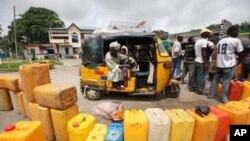Nigeria is moving to stop a $7.5 billion consumer-fuel subsidy because the government says it can better spend those funds improving public services. Trade unions oppose the move, saying it will force up the cost of living.
Africa's largest oil producer refines little of its own petroleum. So Nigerian governments have traditionally subsidized the cost of imported fuel to keep consumer prices at about 40 cents per liter.
In its medium-term fiscal report to parliament, Nigeria's budget office says those subsidies will next year cost the government $7.5 billion at a time when rising demand for dollars to purchase refined fuel is making it harder to maintain the value of the Nigerian currency.
So President Goodluck Jonathan's government says it intends to do away with fuel subsidies and spend the money instead on social services and infrastructure.
Rivers State Governor Rotimi Amaechi is a member of Nigeria's National Economic Council which supports the move.
"We believe it is in the interest of this country," said Amaechi. "We will save money for the development of the economy. And at the end of the day we will provide opportunities for the greater percentage of Nigerians.”
Chief Solomon Osiobe says Nigerians should give up their dependency on subsidized fuel for the greater good.
"We Nigerians, we try to make sacrifices for the good of the nation," said Osiobe. "It is good that we make some sacrifice so that means we can move forward. So this removal of fuel subsidy I am in total support of it if it will bring progress to this country.”
Nigerian trade unions are threatening nationwide strikes if fuel subsidies are dropped. Local government worker Evelyn Akpoku says Nigerians can not afford the higher costs that would follow.
"Right now, the people are facing hardship," said Akpoku. "They are unable to even cook with this kerosene problem. Removing the subsidy will increase their problems. Transport will increase. Food will increase because the transporter will have to get his money from the populous who will be boarding their vehicles.”
University of Abuja economics and political science lecturer Abubakar Sadiq Abba says government must convince Nigerians that it will not misuse the money saved.
"Are we sure the leaders in Nigeria are going to utilize this particular amount that they are going to accrue from the removal of subsidy judiciously and prudently? These are questions that every Nigerian is asking,” said Abba.
Economists who favor eliminating the subsidy say it mostly benefits a cabal of a few hundred fuel traders who are getting rich off the price support. Abba says that is no excuse.
"If the government knows this cabal, if the government knows these people why can't they be arrested? Why can't they be prosecuted,” he said.
Local government worker Akpoku agrees.
“What does the federal government mean by the fuel subsidy money going to the wrong hands? The federal government is in charge," said Apoku. "He should find out who the wrong hands are and then remove the money from the wrong hands and send it to the right hands.”
Rivers State Governor Amaechi says those few Nigerians who benefit disproportionately from the fuel subsidy will only grow richer if it is kept in place because of what he says are legitimate concerns over how that money will otherwise be spent.
"What will be the outcome? What are you going to do to improve on the lives of the people," said Amaechi. "If that is the conversation, they have the governors on their side. But if it is to say, 'No, leave the subsidy the way it is,” and a few Nigerians are benefiting from it to the detriment of over 140 million Nigerians, I won't agree to that.”
National Planning Minister Shamsudeen Usman says the government is working with trade unions to put in place economic safety nets to protect lower income Nigerians from higher fuel costs.
Nigeria Moving to Drop Fuel Subsidy, Trade Unions Object




